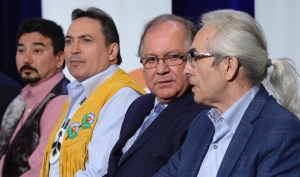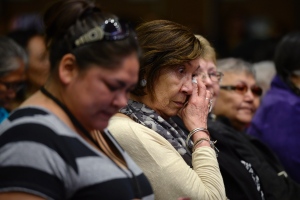|
| "Apologies Not Enough" to Atone for Residential Schools, Church Leaders Say
By Chloe Fedio
CBC News
June 2, 2015
http://www.cbc.ca/news/politics/apologies-not-enough-to-atone-for-residential-schools-church-leaders-say-1.3096863
Reconciliation for the "cultural genocide" of residential schools requires a nation-wide commitment to change policy and commemorate through education, said Justice Murray Sinclair, chair of the Truth and Reconciliation Commission as he released the commission's 94 recommendations Tuesday.
?"Words are not enough," Sinclair said. "Reconciliation is not an aboriginal problem — it is a Canadian problem. It involves all of us."
Aboriginal leaders, church representatives and government and opposition leaders all acknowledged the commission's work is just the beginning to arrive at reconciliation, with many agreeing the history and legacy of residential schools should be part of the Canadian education curriculum.
Sinclair said seven generations were denied their identity as they were separated from their language, culture, spiritual traditions and their collective history.
"Survivors were stripped of the ability to answer these questions, but they were also stripped of the love of their families. They were stripped of their self-respect and they were stripped of their identity," he said.
The commission's report was released Tuesday after six years of hearings and testimony from more than 6,000 residential school survivors and their loved ones. Sinclair received several lengthy standing ovations while telling a packed Ottawa ballroom about the recommendations.
Those 94 recommendations call for change in policies and programs, as well as commemoration and memorials. A final report will be issued at the end of the year.
Sinclair also called for a national inquiry into missing and murdered aboriginal women, an annual report on the state of Aboriginal Peoples and action on the overrepresentation of aboriginal people, especially youth, in custody.
"You don't have to believe that reconciliation will happen, you need to believe that reconciliation should happen," he told the crowd.
"Our leaders must not fear this onus of reconciliation. The burden is not theirs to bear alone, rather, reconciliation is a process that involves all parties of this new relationship."
Later, a press conference, Sinclair said the report is meant to "stand the test of time," and is not just for the current government.
'Remember and change'
Archbishop Fred Hiltz, Primate of the Anglican Church of Canada, delivered a joint statement with representatives from the Presbyterian, United and Catholic churches. He acknowledged the "heartbreaking stories" of young students at schools that were administered by the churches.
"We know and declare that our apologies are not enough," he said. "Those harmed were children, vulnerable, far from their families and their communities. The sexual, physical and emotional abuse they suffered is well documented, particularly in the work of the TRC."
Aboriginal Affairs Minister Bernard Valcourt said reconciliation is not to "forgive and forget, but to remember and change."
He said "it's not going to be an easy journey" to arrive at reconciliation but said the government was committed to continue to work to improve relationships between aboriginal and non-aboriginal people.
?"This dark chapter in Canada's history has left a mark on our country," he said. "I'm confident that we can build on the important work that's been done and continue to heal as a nation."
NDP Leader Tom Mulcair hailed the report, saying aboriginal affairs touches the future of the economy, the development of resources and the environment.
"Let's recognize the harm that's been done and let's change our attitudes," he told reporters. "We can't let this incredible work not constitute the opportunity to change things for the future."
Liberal Leader Justin Trudeau offered "unwavering support" for the report's recommendations.
 |
Former Grand Chief of the Assembly of First Nations Phil Fontaine (right to left), Aboriginal Affairs Minister Bernard Valcourt, current AFN Chief Perry Bellegarde and National Inuit Leader Terry Audla, President of Inuit Tapiriit Kanatami, look on at the release of the report on Canada's residential school system at the Truth and Reconciliation Commission in Ottawa on Tuesday, June 2, 2015. (Adrian Wyld/Canadian Press)
|
Assembly of First Nations Chief Perry Bellegarde said that while Prime Minister Stephen Harper issued an apology to former residential school students in 2008, it's time for the next step.
"It really is an empty, meaningless apology without action," Bellegarde said.
Phil Fontaine, a former national chief of the Assembly of First Nations and a residential school survivor, said it's been a "long and painful" journey to arrive at this "historic moment" in Canadian history.
"This day will help us put that pain behind us," he said. "This day, Canada has come of age."
Must make 'broken country whole again'
In between the commissioners' speeches, videos presented residential school survivors speaking emotionally about what they experienced while in the schools. Many of the survivors broke down while recalling dark, disturbing moments in explicit detail.
The videos also included speeches from Aboriginal leaders, former prime ministers Paul Martin and Joe Clark and non-aboriginal people, including schoolchildren, talking about the need to confront the legacy of the residential schools
Commissioner Marie Wilson thanked residential school survivors for their bravery and trust in sharing their experiences.
"And now we must — we must demand that same bravery and trust from all Canadians. Not just government officials, not just elected leaders, but every person in Canada," she said.
"We need reconciliation so that a broken country can become whole again."
At least 3,200 students never returned home from residential schools — in a third of those cases, their names were not recorded and in half their cause of death was not recorded, she said. Children were buried at schools that often had graveyards but no playgrounds, she said.
"Parents who had their children ripped out of their arms, taken to a distant and unknown place, never to be seen again. Buried in an unmarked grave, long ago forgotten and overgrown. Think of that. Bear that. Imagine that. The reason of death a mystery," she said.
The commission established the National Residential School Student Death Register in an effort to record those names.
She emphasized the major gaps in Canadian history classes and called for considerate change to lessons.
"How frank and truthful are we with Canadian students about the history of residential schools and the role our governments and religious institutions played in its systematic attempt to erase the cultures of aboriginal people?" she said.
 |
Residential school survivors and aboriginal women react as Truth and Reconciliation Commission Chair Murray Sinclair speaks at the release of the commission's report Tuesday. (Adrian Wyld/The Canadian Press)
|
Report commissioner Chief Wilton Littlechild spoke of his own time in residential school, and emphasized how the importance of families resonated in the commission's work.
"Families that had been attacked, both individually and collectively, by a policy designed to tear families apart and to remove the spirit of Indigenous people. A policy that sought to turn families against each other," he said.
"That did, and continues to, impact aboriginal families and intergenerational survivors. Despite these immense obstacles, our families remained resilient."?
|

